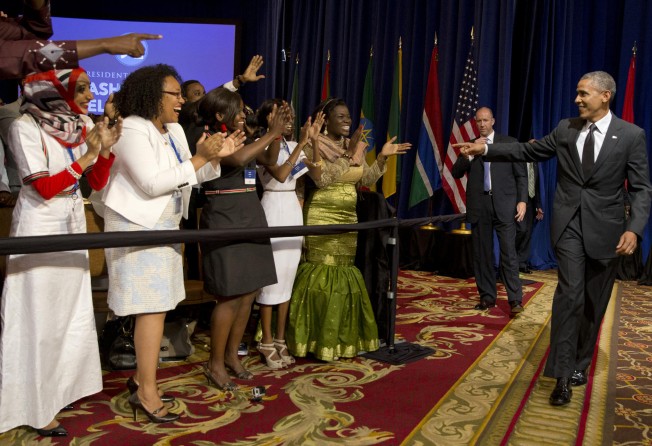Obama to use African summit in US to focus on Islamist violence
US president will use Washington summit to discuss rising Islamist violence on continent, but is unlikely to increase direct military aid

Rising violence from brutal Islamist groups in Africa will be a key issue at an African summit US President Barack Obama is hosting in Washington this week.
But while insecurity created by Boko Haram in Nigeria and Cameroon, or by al-Shabab in Somalia and parts of Kenya and Uganda, is worrying, the United States is wary about greatly increasing direct military support to beleaguered governments.
Instead, observers say, Washington prefers to support multinational African forces like those of the African Union (AU), which, despite problems, are seen as more transparent than many national armies.
Obama has said the summit - a first-of-its-kind meeting that opened yesterday - would provide a forum to "talk to Africa about security issues".
But such strong partners are not always available, and analysts say that if the United States hopes to have an impact in the continent's hot spots it will have to work with some of Africa's most troubled militaries.
American officials have for years said they were willing to help Nigeria combat Boko Haram, whose uprising has killed more than 10,000 people since 2009.
But the group's kidnapping of more than 200 schoolgirls in April grabbed the world's attention and spurred Washington in May to offer military and intelligence support.
Nigeria accepted the offer, but evidence suggests the country was not particularly interested in operational help or training, said John Campbell, a former US ambassador to Nigeria now with the Council on Foreign Relations.
"Please drop off some hardware. Please write a cheque," was a likely Nigerian response to US defence and FBI experts who landed in Nigeria, a country with a decades-long history of corruption, Campbell said.
Aside from marginal training and surveillance assistance, the ex-ambassador said he had seen "almost nothing" emerge from the new cooperation.
For Campbell, the question facing US policymakers is: does Nigeria's military, which has a grim human rights record, "want help from outsiders or not"?
Aside from relentless attacks in war-torn Somalia, al-Shabab insurgents have killed civilians across East Africa, including bombings in Uganda's capital in 2010 and gun attacks in a Nairobi shopping centre last year.
The US provides logistical, training, intelligence and financial assistance to the African troops fighting in Somalia.
It is the type of intervention the administration would like "to build on", Deputy National Security Adviser Ben Rhodes said ahead of the summit.
He added that the US remained "concerned about efforts by terrorist groups to gain a foothold" in Africa, even if many analysts saw groups like Boko Haram and al-Shabab as being domestically focused, with almost no intention of plotting attacks on American soil.
While the AU mission against al-Shabab has been credited with barring the insurgents from overrunning Somalia and keeping the fragile Western-backed government in power, the pan-African force has also been controversial.
Salaries for soldiers on the ground have reportedly been pocketed by commanders and there is speculation that weapons meant for peacekeepers have ended up in al-Shabab hands.
The force is led by troops from Uganda, a country whose relationship with the US has deteriorated. Its military has always been tightly controlled by President Yoweri Museveni and his loyalists, who are accused of looting tens of millions of dollars in US foreign aid since taking power in 1986 and using the army to crack down on political opponents.
An anti-homosexuality law, which US Secretary of State John Kerry has compared to Nazi-era measures, has intensified scrutiny of all US support to Kampala.
A Ugandan court struck the law down last week, but Museveni's allies say it remains intact and could be reinstated on appeal.
A small detachment of US special forces has been based in the Obo region of the Central African Republic since 2011, helping hunt for Lord's Resistance Army (LRA) commander Joseph Kony, who is wanted by the International Criminal Court.
Kony, who launched his rebellion in northern Uganda in the late 1980s, has been forced out of his home country, but Ugandan troops are still on his trail.
US National Security Adviser Susan Rice said killings by the LRA had fallen 75 per cent since the US formally joined the Kony hunt in 2010.
Former ambassador Campbell agreed that the LRA mission could be seen as a success story for the US in Africa, even if the ultimate goal remained unfinished.
"The last time I looked, Joseph Kony was still at large. On the other hand the depredations appear to be over," he said.
Meanwhile, Kenya was determined to do whatever it took to eradicate al-Qaeda-linked militants in Somalia, to prevent East Africa's biggest economy from becoming enmeshed in fighting a Nigeria-type insurgency, President Uhuru Kenyatta said.
Kenya would spend more on security after decades of "severe underinvestment" and wanted to work more closely with the international community to fight terrorism, he added.
He rejected calls by opposition leader Raila Odinga for the withdrawal of Kenyan forces from Somalia, saying that may lead to an onslaught similar to the one by Boko Haram militants in northeast Nigeria.
Additional reporting by Bloomberg
